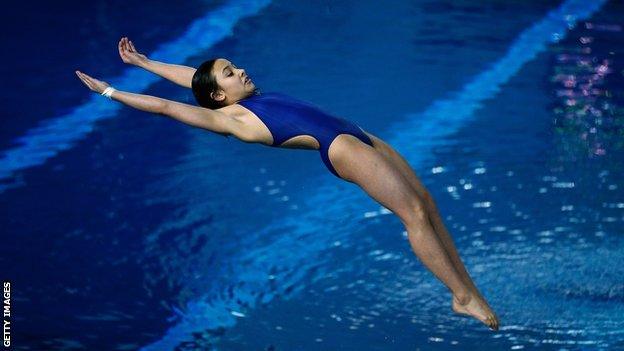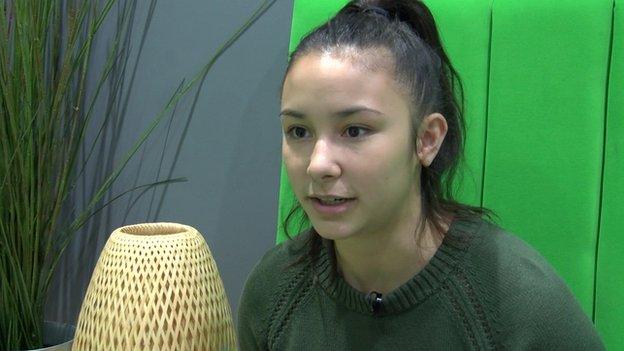Victoria Vincent: Ex-GB diver on mental health effects after career-ending eye injury
- Published

Victoria Vincent was the 2016 European junior champion
"I'll always think 'what if', but I'm not a diver, it's not who I am any more."
She may be only 18 years old, but Victoria Vincent's life experience could easily be that of someone twice her age.
A diving protégé as a youngster, she was forced to give up the sport she loved after a serious eye injury.
While the physical pain has long since gone, the effects on Vincent's mental wellbeing have only just dissipated as she pursues a new career in medicine.
She told BBC Sport about her time as a top young diver, training alongside some of the world's best, and the issues that followed the premature end to her career.
The next big diving star
Young divers relocate to Plymouth
Vincent was only 11 when she decided to end a career as a budding young actress, having appeared in The King and I at the Royal Albert Hall in 2009 and the CBBC show The Legend of Dick and Dom.
She moved from south London to Plymouth with her mother to further her diving career and trained each day alongside world champion and international star Tom Daley, as well as European champions Tonia Couch and Sarah Barrow.
Vincent thrived in that environment and became British 10m platform champion at the age of 13.
After she was told she was too young to represent England at the 2014 Commonwealth Games despite winning the trials, her coach Andy Banks - who also masterminded Daley's early career - successfully appealed to allow her to become the youngest member of Team England in Glasgow that summer.
But in the months before she headed to Scotland, her career had already begun to unravel because of the injury that would ultimately send her life in a new direction.
"I missed my hands as I entered the water and I left my eye open and it just went black," Vincent recalls of the day she detached the retina in her left eye.
"When you're diving off 10 metres you think you're pretty much invincible. I went to the Commonwealth Games with a dodgy eye. I lost my peripheral vision and started to see flashing lights and black dots floating around.
"It was only after the Games that I thought maybe I should get it checked out."
Vincent went to hospital, hoping to get a short-term fix so she could attend a Great Britain training camp before Christmas in 2014.
"They said to me: 'If you leave [treatment] you may not get your sight back'."
It was a stark warning. She missed all of 2015, but was fit enough to return to the top deck at the diving pool the following year and won the European junior title.
While her dream of making the Rio Olympics had gone - a year's missed training meant she was not able to make the required standard - she was targeting Tokyo 2020 until her eye problems returned.
"I got told I had a cataract, which meant another operation to replace the lens, and that weakened my eye," Vincent adds.
"They said: 'If you were to dive off 10 metres, we're not sure whether your eye can withstand that pressure difference between 10 metres and the bottom of the pool'."
'It was just really dark'
Victoria Vincent wins appeal to dive for England at Glasgow 2014
Vincent tried to transfer her talents to the 3m board and 1m springboard, but could not replicate her earlier success.
"I hated it so much," she recalls. "I used to go into training and I'd look at the platform and I'd just think, 'if I'd have sorted it out as soon as it happened I may still be able to go off 10 metres'."
It was at this point that Vincent's mental wellbeing started to suffer.
"I had quite a lot going on in my life. I hadn't quite sorted some stuff out from my childhood, quite a lot of stuff happened when I was moving to Plymouth which I found quite difficult, but I just sort of buried that," she explains.
"But as soon as I had this retinal detachment and cataract problem, and got told I couldn't do 10 metres any more and the dream of going to the 2016 or any Olympics was taken away from me, that was when it all went downhill.
"I just felt really down, it was just really dark. I don't even know how to describe it, it just did not feel good. Everything was so overwhelming, the amount of stuff that had gone wrong was just too much."
Vincent's depression became worse when Banks, a man she describes as a "second father", left Plymouth for a role as Australia's national coach and it was only then that she decided she needed to reach out for help.
"I had to write down what was wrong because I couldn't even bring myself to say what was wrong - I felt so overwhelmed," she says.
"At points I thought that how I felt wasn't justified. I felt like other people deserved support more than I did, and so that was quite difficult for me to be a bit selfish and say, 'it's my turn, I need some help now'.
"But the more you talk about it, the better it gets. It's just getting to the point where you have the confidence to come out and talk about it, and that's something that I think a lot of people need to understand."
New start in medicine

Victoria Vincent is now studying medicine
Vincent's story could be seen as another example of a sportsperson being elevated to a level which they were not ready to handle at a young age.
But was it a case of 'too much too young'?
"A lot of people have said that. But in my opinion I don't think it was," she says.
"From a very young age I was exposed to the limelight in terms of my acting career; I performed at the Royal Albert Hall, I was going to do a film but I couldn't because I went to a gym competition instead.
"The problem was that I didn't sort out the issues that I had when I was younger, which then accumulated over time and just spilled out when my retina detached."
But when one door closes another can open and the end of Vincent's diving career last year allowed her to focus all her energies on her studies. She is now in her first year studying medicine in Plymouth.
"I think it's made me a stronger, more resilient person," she says of her life experiences so far.
"I think because of the experiences I've had I'd like to think I'm more empathetic, I understand other people's situations a lot better than I would have done had I not been through this.
"If I hadn't detached my retina, I wouldn't have been able to work as hard as I did at school and get the grades that I did and I wouldn't have been able to become a doctor."